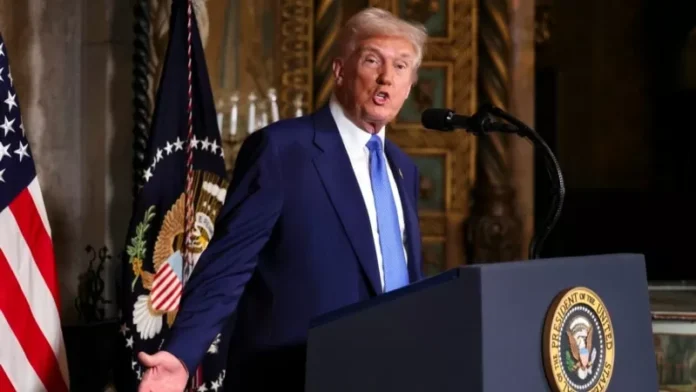U.S. President Donald Trump has once again stirred controversy with his recent comments about Ukrainian President Volodymyr Zelenskyy. In a series of tweets on Wednesday, Trump lashed out at Zelenskyy, calling him a “dictator without elections” and accusing him of living in a Russian-influenced “disinformation space.”
The tension between the two leaders comes at a critical time for Ukraine, as the country continues to struggle with a three-year war against Russia. Zelenskyy has expressed concerns that Trump may be trying to end the war on terms that are more favorable to Moscow than to Kyiv.
Trump’s attack on Zelenskyy centered around the Ukrainian leader’s decision to delay the country’s scheduled elections in April 2024, which were postponed due to Russia’s invasion in 2022. Trump accused Zelenskyy of being responsible for the war and criticized him for “talking the United States of America into spending $350 billion dollars” on a conflict that “never had to start.”
The U.S. leader also took a jab at Zelenskyy’s background as a comedian, saying that the only thing he was good at was “playing [former U.S. President Joe] Biden like a fiddle” to secure more military assistance. Trump’s comments have caused outrage among many Ukrainians, who see them as disrespectful and dismissive of their country’s struggles.
Zelenskyy, on the other hand, has expressed his frustration at being excluded from high-level U.S.-Russian diplomatic talks in Saudi Arabia on Tuesday. He accused the U.S. leader of not taking Ukraine’s interests into consideration and of trying to reach a settlement with Russia without involving Kyiv.
The talks in Riyadh, led by U.S. Secretary of State Marco Rubio and Russian Foreign Minister Sergey Lavrov, were the first significant discussions between the two superpowers in over three years. Russian President Vladimir Putin declared the talks a “first step” in improving relations between the two countries, but also emphasized the need for trust between Russia and the U.S. before the war can be resolved.
While the talks did not include Ukrainian or European officials, the U.S. has stated that they will be involved in future negotiations to end the conflict. Zelenskyy has repeatedly stated that Ukraine will not accept a dictated settlement of the war and has called for the U.S. to provide more support, such as air defense systems, to help end the conflict.
The tension between Trump and Zelenskyy highlights the differing approaches of the two leaders towards the war in Ukraine. While former President Biden provided significant military aid to Kyiv, Trump has pushed for a quick resolution to the conflict. Zelenskyy has accused Trump of living in a “disinformation space” and has expressed his disappointment at the lack of support from the U.S.
In a meeting with Trump’s Ukraine envoy, Gen. Keith Kellogg, Zelenskyy stated that he believes the U.S. wants the war to end, but that there are still ways they can help, such as providing air defense systems. Kellogg reiterated the U.S.’s commitment to finding a fair and sustainable solution to the conflict.
The talks in Riyadh were followed by a second round of discussions in France, where European leaders met to discuss the conflict and show their support for Ukraine. The U.S. has also met with European leaders to discuss the war, with Rubio stating that both Ukraine and Russia will have to make concessions for peace to be achieved.
Zelenskyy’s planned trip to Saudi Arabia was postponed, with the Ukrainian leader stating that he did not want his visit to be linked to the U.S.-Russia talks. The State Department has stated that both countries have agreed to appoint high-level teams to work towards ending the conflict as soon as possible, calling the meeting an “important step forward” towards peace.
The tension between Trump and Zelenskyy highlights the complexities of the ongoing conflict in Ukraine and the differing approaches of the two leaders. As the war continues to take a toll on the country and its people, it is crucial for all parties involved to work towards a fair and sustainable solution that will bring an end to the conflict.

